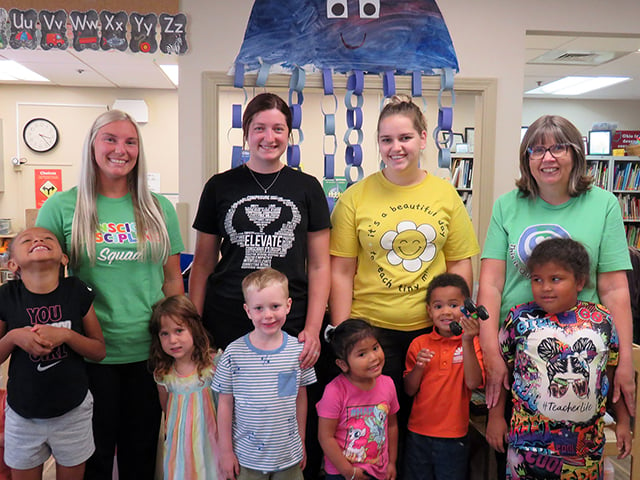Published: August 18, 2023

Walking around an exhibit hall at an NAEYC conference, Kendal Early Learning Center Director Jeni Hoover came across a Conscious Discipline (CD) booth. She was curious, explored deeper and it didn’t take long for her to “catch” the CD “fever.” Now, 12 years later, this adult first self-regulation program is key to KELC’s success, with parents and staff joining the bandwagon.
“It just made so much sense,” says Jeni, who is a mother of two boys.
What is Conscious Discipline?
Conscious Discipline is based on seven skills: Composure, Encouragement, Assertiveness, Choices, Empathy, Positive Intent and Consequences.
“The Seven Skills of Discipline are the only skills we need to transform these everyday discipline issues into teaching moments. These moments are our opportunity to teach children the social-emotional and communication skills necessary to manage themselves, resolve conflict, prevent bullying and develop pro-social behaviors,” according to Conscious Discipline, which in 25 years has reached an estimated 20 million children in 100 countries.
Learning to incorporate Conscious Discipline into the classroom is a “long journey,” Jeni says, and it involves incorporating it into everyday life both at home and at work for all staff. She compares it to a buffet, each time you go up for more you take away something different. The same is true when you attend Conscious Discipline trainings.
It also involves bringing parents into the process and teaching them the skills. That’s why she has started book clubs with parents, using “Easy to Love, Difficult to Discipline,” one of many books written by Conscious Discipline founder Dr. Becky Bailey. (Thanks to a grant, KELC now gives each parent a copy of the book when they enroll their child.)
Conscious Discipline in Action
Kendal Early Learning Center preschoolers do not keep track of their good deeds by putting stickers on a “sticker chart.” Instead, they maintain a “celebration board” in which they can add friends, staff, parents, or grandfriends (typically Kendal residents) when they are helpful to others in the classroom.
For instance, when the preschoolers looked out the window recently and saw resident Nick Long watering the garden, one of them exclaimed “Let’s put him on the celebration board.”
The center also does not have a spot for time outs. Instead, the center has a “safe place,” where a child can voluntarily go when he or she needs time to calm down or process big feelings. They teach the staff and children the steps to work through their big feelings and they practice these skills when they are in the safe place.
And when a classmate calls someone a name or says something mean-spirited, the injured child is empowered to express his or her feelings, such as “I don’t like you calling me..., My name is…” rather than the teacher stepping in to solve the problem for the child.
Conscious Discipline and Adults
Teachers, parents and grandparents can benefit by learning how to utilize Conscious Discipline in their interactions with children, but the skills can be used to improve adult-to-adult interactions too, Jeni says.
Just as children have seven skills, or powers, Conscious Discipline has outlined seven powers for Conscious Adults:
- No one can make you angry without your permission. (Power of Perception)
- Whatever we focus on, we get more of. (Power of Attention)
- We are all in this together. (Power of Unity)
- The only person you can change is you. (Power of Free Will)
- The moment is as it is. (Power of Acceptance)
- Choose to see the best in others. (Power of Love)
- Mistakes are opportunities to learn. (Power of Intention)
And whether it’s interacting with children or adults, we all have our memories, like a CD-ROM inside us. Your CD-ROM is made up of the experiences you had as a child, how your parents disciplined you, and other childhood experiences. Our brain naturally goes back to our CD-ROM that is within us and that’s why Conscious Discipline is really an adult first program. Once the adult learns the skills, then they can model the skills in everyday life and successfully teach the child the skills.
For instance, Jeni said she realized she can be triggered when her sons do something that she was not allowed to do as a child. This was a trigger for her parents when she was growing up, and it's on her CD-ROM. Now that she is aware of why this was a trigger for her, she can deal with the situation more calmly. Her children have been raised in a traditional discipline home and then shifted to Conscious Discipline as she grew to truly understand and implement this program. She says they are “bilingual” when it comes to discipline.
At a recent Kendal leadership meeting, Human Resources Director Toni Merleno gave an overview of Conscious Discipline and said she would like to see more staff training on the topic.
“Productive teams in the workplace are fully dependent on coworker relationships. When these relationships become problematic, productivity suffers and employee turnover increases, especially when there is a leadership vacuum, apathetic to the root cause of the problem. Kendal Values mirror the principles of Conscious Discipline, treating all with equity and courtesy, caring first for others over oneself. No wonder this curriculum has such a natural fit in our Kendal at Oberlin community.” Toni says.
Young or Old, Big or Small, Intergenerational Relationships Are Good For All!
Find out how you can benefit today's youth and how they are helping others like you in our eBook.
 In the past, Molly Kavanaugh frequently wrote about Kendal at Oberlin for the Cleveland Plain Dealer, where she was a reporter for 16 years. Now we are happy to have her writing for the Kendal at Oberlin Community.
In the past, Molly Kavanaugh frequently wrote about Kendal at Oberlin for the Cleveland Plain Dealer, where she was a reporter for 16 years. Now we are happy to have her writing for the Kendal at Oberlin Community.
About Kendal at Oberlin: Kendal is a nonprofit life plan community serving older adults in northeast Ohio. Located about one mile from Oberlin College and Conservatory, and about a 40 minute drive from downtown Cleveland, Kendal offers a vibrant resident-led lifestyle with access to music, art and lifelong learning.




